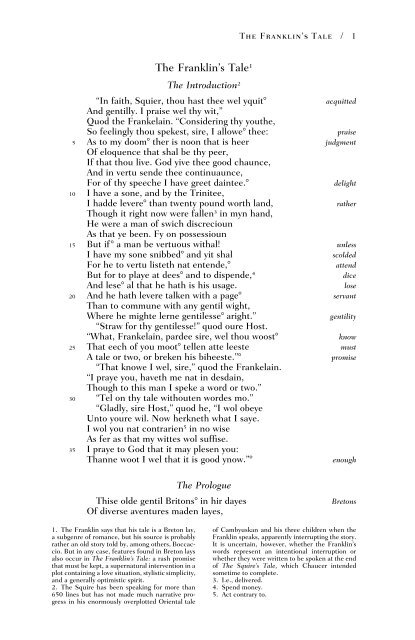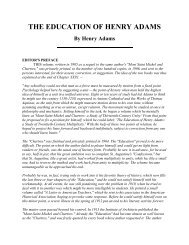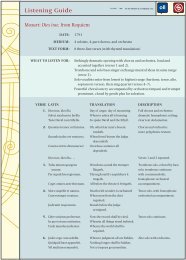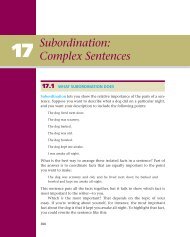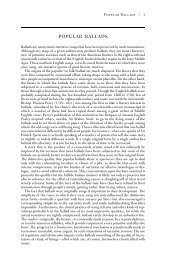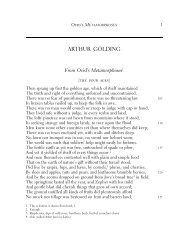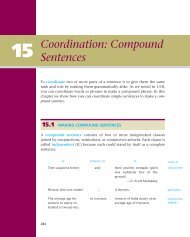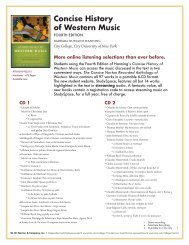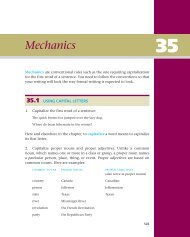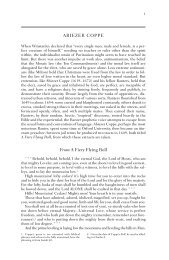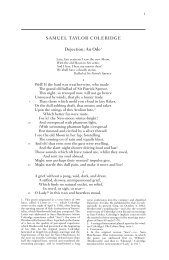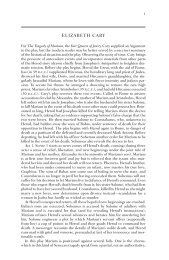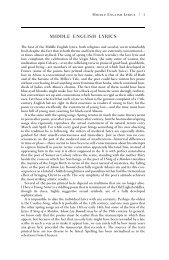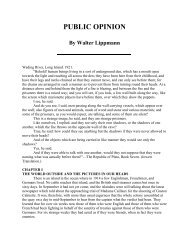You also want an ePaper? Increase the reach of your titles
YUMPU automatically turns print PDFs into web optimized ePapers that Google loves.
1. <strong>The</strong> Franklin says that his tale is a Breton lay,<br />
a subgenre of romance, but his source is probably<br />
rather an old story told by, among others, Boccaccio.<br />
But in any case, features found in Breton lays<br />
also occur in <strong>The</strong> Franklin’s <strong>Tale</strong>: a rash promise<br />
that must be kept, a supernatural intervention in a<br />
plot containing a love situation, stylistic simplicity,<br />
and a generally optimistic spirit.<br />
2. <strong>The</strong> Squire has been speaking for more than<br />
650 lines but has not made much narrative progress<br />
in his enormously overplotted Oriental tale<br />
<strong>The</strong> Franklin’s <strong>Tale</strong> 1<br />
<strong>The</strong> Introduction 2<br />
<strong>The</strong> Franklin’s <strong>Tale</strong> / 1<br />
“In faith, Squier, thou hast thee wel yquit acquitted<br />
And gentilly. I praise wel thy wit,”<br />
Quod the Frankelain. “Considering thy youthe,<br />
So feelingly thou spekest, sire, I allowe thee: praise<br />
5 As to my doom ther is noon that is heer judgment<br />
Of eloquence that shal be thy peer,<br />
If that thou live. God yive thee good chaunce,<br />
And in vertu sende thee continuaunce,<br />
For of thy speeche I have greet daintee. delight<br />
10 I have a sone, and by the Trinitee,<br />
I hadde levere than twenty pound worth land, rather<br />
Though it right now were fallen 3 in myn hand,<br />
He were a man of swich discrecioun<br />
As that ye been. Fy on possessioun<br />
15 But if a man be vertuous withal! unless<br />
I have my sone snibbed and yit shal scolded<br />
For he to vertu listeth nat entende, attend<br />
But for to playe at dees and to dispende, 4 dice<br />
And lese al that he hath is his usage. lose<br />
20 And he hath levere talken with a page servant<br />
Than to commune with any gentil wight,<br />
Where he mighte lerne gentilesse aright.” gentility<br />
“Straw for thy gentilesse!” quod oure Host.<br />
“What, Frankelain, pardee sire, wel thou woost know<br />
25 That eech of you moot tellen atte leeste must<br />
A tale or two, or breken his biheeste.” promise<br />
“That knowe I wel, sire,” quod the Frankelain.<br />
“I praye you, haveth me nat in desdain,<br />
Though to this man I speke a word or two.”<br />
30 “Tel on thy tale withouten wordes mo.”<br />
“Gladly, sire Host,” quod he, “I wol obeye<br />
Unto youre wil. Now herkneth what I saye.<br />
I wol you nat contrarien 5 in no wise<br />
As fer as that my wittes wol suffise.<br />
35 I praye to God that it may plesen you:<br />
Thanne woot I wel that it is good ynow.” enough<br />
<strong>The</strong> Prologue<br />
Thise olde gentil Britons in hir dayes Bretons<br />
Of diverse aventures maden layes,<br />
of Cambyuskan and his three children when the<br />
Franklin speaks, apparently interrupting the story.<br />
It is uncertain, however, whether the Franklin’s<br />
words represent an intentional interruption or<br />
whether they were written to be spoken at the end<br />
of <strong>The</strong> Squire’s <strong>Tale</strong>, which Chaucer intended<br />
sometime to complete.<br />
3. I.e., delivered.<br />
4. Spend money.<br />
5. Act contrary to.
2 / Geoffrey Chaucer<br />
Rymeyed 6 in hir firste Briton tonge;<br />
40 Whiche layes with hir instruments they songe, sung<br />
Or elles redden hem for hir plesaunce; read<br />
And oon of hem have I in remembraunce,<br />
Which I shal sayn with good wil as I can.<br />
But sires, by cause I am a burel man, ignorant<br />
45 At my biginning first I you biseeche<br />
Have me excused of my rude speeche.<br />
I lerned nevere retorike, certain: rhetoric<br />
Thing that I speke it moot be bare and plain; must<br />
I sleep nevere in the Mount of Parnaso, 7 slept<br />
50 Ne lerned Marcus Tullius Scithero; Cicero<br />
Colours 8 ne knowe I noon, withouten drede, doubt<br />
But swiche colours as growen in the mede, meadow<br />
Or elles swiche as men dye or painte;<br />
Colours of retorike been too quainte: unfamiliar<br />
55 My spirit feeleth nat of swich matere.<br />
But if you list, my tale shul ye heere.<br />
6. Composed in rhyme.<br />
7. Parnassus, home of the Muses.<br />
8. I.e., rhetorical figures.<br />
9. I.e., made every effort.<br />
1. I.e., one of.<br />
<strong>The</strong> <strong>Tale</strong><br />
In Armorik, that called is Britaine, Armorica / Brittany<br />
<strong>The</strong>r was a knight that loved and dide his paine 9<br />
To serve a lady in his beste wise;<br />
60 And many a labour, many a greet emprise enterprise<br />
He for his lady wroughte er she were wonne,<br />
For she was oon 1 the faireste under sonne,<br />
And eek therto come of so heigh kinrede kindred<br />
That wel unnethes 2 dorste this knight for drede<br />
65 Telle hire his wo, his paine, and his distresse.<br />
But atte laste she for his worthinesse,<br />
And namely for his meeke obeisaunce, especially / obedience<br />
Hath swich a pitee caught of his penaunce suffering<br />
That prively she fil of 3 his accord<br />
70 To taken him for hir housbonde and hir lord,<br />
Of swich lordshipe as men han over hir wives.<br />
And for to lede the more in blisse hir lives,<br />
Of his free wil he swoor hire as a knight<br />
That nevere in al his lif he day ne night<br />
75 Ne sholde upon him take no maistrye dominion<br />
Again hir wil, ne kithe hire jalousye, show<br />
But hire obeye and folwe hir wil in al,<br />
As any lovere to his lady shal— ought<br />
Save that the name of sovereinete, sovereignty<br />
80 That wolde he have, for shame of 4 his degree.<br />
She thanked him, and with ful greet humblesse<br />
She saide, “Sire, sith of youre gentilesse since<br />
Ye profre me to have so large 5 a reine,<br />
2. With difficulty.<br />
3. I.e., fell in.<br />
4. Out of respect for.<br />
5. I.e., free.
6. As a result of.<br />
7. Troth, word of honor.<br />
8. By nature.<br />
9. I.e., overcome.<br />
1. So may I walk, an oath.<br />
2. I.e., planetary influences.<br />
<strong>The</strong> Franklin’s <strong>Tale</strong> / 3<br />
85<br />
Ne wolde nevere God bitwixe us twaine,<br />
As in6 my gilt, were outher werre or strif.<br />
Sire, I wol be your humble, trewe wif—<br />
either / war<br />
Have heer my trouthe7 —til that myn herte breste.”<br />
Thus been they bothe in quiete and in reste.<br />
break<br />
For oo thing, sires, saufly dar I saye: safely<br />
90 That freendes everich other moot obeye,<br />
If they wol longe holden compaignye.<br />
lovers / each / must<br />
Love wol nat be constrained by maistrye:<br />
Whan maistrye comth, the God of Love anoon<br />
Beteth his winges and farewel, he is goon!<br />
force<br />
95 Love is a thing as any spirit free;<br />
Wommen of kinde8 desiren libertee,<br />
And nat to been constrained as a thral—<br />
And so doon men, if I sooth sayen shal.<br />
Looke who that is most pacient in love,<br />
slave<br />
100 He is at his avantage al above.<br />
Pacience is an heigh vertu, certain,<br />
For it venquissheth, as thise clerkes sayn,<br />
Thinges that rigour sholde nevere attaine.<br />
vanquishes<br />
9<br />
For every word men may nat chide or plaine: at / complain<br />
105 Lerneth to suffre, or elles, so mote I goon, 1<br />
Ye shul it lerne, wherso ye wol or noon.<br />
For in this world, certain, ther no wight is<br />
That he ne dooth or saith somtime amis:<br />
Ire, siknesse, or constellacioun,<br />
whether<br />
2<br />
110 Win, wo, or chaunging of complexioun3 Causeth ful ofte to doon amis or speken.<br />
On every wrong a man may nat be wreken: avenged<br />
After the time moste be temperaunce<br />
To every wight that can on governaunce.<br />
must<br />
4<br />
115 And therfore hath this wise worthy knight<br />
To live in ese suffrance hire bihight, toleration / promised<br />
And she to him ful wisly gan to swere surely<br />
That nevere sholde ther be defaute in here.<br />
Here may men seen an humble wis accord:<br />
defect<br />
120 Thus hath she take hir servant and hir lord—<br />
Servant in love and lord in mariage.<br />
Thanne was he bothe in lordshipe and servage. 5<br />
Servage? Nay, but in lordshipe above,<br />
Sith he hath bothe his lady and his love; since<br />
125 His lady, certes, and his wif also,<br />
<strong>The</strong> which that6 lawe of love accordeth to.<br />
And whan he was in this prosperitee,<br />
Hoom with his wif he gooth to his contree,<br />
Nat fer fro Pedmark7 ther his dwelling was,<br />
130 Wher as he liveth in blisse and in solas. delight<br />
3. <strong>The</strong> balance of humors in the body.<br />
4. Is capable of self-control.<br />
5. Position of a servant.<br />
6. As.<br />
7. Penmarch, in Brittany.
4 / Geoffrey Chaucer<br />
Who coude telle but he hadde wedded be<br />
<strong>The</strong> joye, the ese, and the prosperitee<br />
That is bitwixe an housbonde and his wif?<br />
A yeer and more lasted this blisful lif,<br />
135 Til that the knight of which I speke of thus,<br />
That of Kairrud 8 was cleped Arveragus, called<br />
Shoop him 9 to goon and dwelle a yeer or twaine<br />
In Engelond, that cleped was eek Britaine, also<br />
To seeke in armes worshipe and honour—<br />
140 For al his lust he sette in swich labour— pleasure<br />
And dwelled ther two yeer, the book saith thus.<br />
Now wol I stinte of this Arveragus, cease<br />
And speke I wol of Dorigen his wif,<br />
That loveth hir housbonde as hir hertes lif.<br />
145 For his absence weepeth she and siketh, sighs<br />
As doon thise noble wives whan hem liketh. 1<br />
She moorneth, waketh, waileth, fasteth, plaineth; complains<br />
Desir of his presence hire so distraineth afflicts<br />
That al this wide world she sette 2 at nought.<br />
150 Hir freendes, whiche that knewe hir hevy thought,<br />
Conforten hire in al that evere they may:<br />
<strong>The</strong>y prechen hire, they telle hire night and day<br />
That causeless she sleeth hirself, allas; slays<br />
And every confort possible in this cas<br />
155 <strong>The</strong>y doon to hire with al hir bisinesse, assiduousness<br />
Al for to make hire leve hir hevinesse. abandon<br />
By proces, 3 as ye knowen everichoon,<br />
Men may so longe graven in a stoon engrave<br />
Til som figure therinne emprinted be:<br />
160 So longe han they conforted hire til she<br />
Received hath, by hope and by resoun,<br />
<strong>The</strong> emprinting of hir consolacioun,<br />
Thurgh which hir grete sorwe gan assuage:<br />
She may nat alway duren in swich rage. remain / passion<br />
165 And eek Arveragus in al this care<br />
Hath sent hir lettres hoom of his welfare,<br />
And that he wol come hastily again—<br />
Or elles hadde this sorwe hir herte slain.<br />
Hir freendes sawe hir sorwe gan to slake, diminish<br />
170 And prayed hire on knees, for Goddes sake,<br />
To come and romen hire in compaignye,<br />
Away to drive hir derke fantasye,<br />
And finally she graunted that requeste:<br />
For wel she saw that it was for the beste.<br />
175 Now stood hir castel faste by the see,<br />
And often with hir freendes walketh she,<br />
Hire to disporte upon the bank an heigh,<br />
Wher as she many a ship and barge seigh, vessel / saw<br />
Sailing hir cours wher as hem liste go—<br />
8. Kerru, a town in Brittany.<br />
9. Prepared.<br />
1. It pleases.<br />
2. I.e., valued.<br />
3. Course of time.
4. I.e., grievous.<br />
5. I.e., without purpose.<br />
6. Mark, i.e., image.<br />
7. May please.<br />
8. I.e., this is.<br />
<strong>The</strong> Franklin’s <strong>Tale</strong> / 5<br />
180 But thanne was that a parcel of hir wo, component<br />
For of hirself ful ofte, “Allas!” saith she,<br />
“Is ther no ship of so manye as I see<br />
Wol bringen hoom my lord? Thanne were myn herte<br />
Al warisshed of his bittre paines smerte.” recovered<br />
185 Another time ther wolde she sitte and thinke,<br />
And caste hir yën downward fro the brinke;<br />
But whan she sawgh the grisly rokkes blake,<br />
For verray fere so wolde hir herte quake real<br />
That on hir feet she mighte hire nat sustene: sustain<br />
190 Thanne wolde she sitte adown upon the greene<br />
And pitously into the see biholde,<br />
And sayn right thus, with sorweful sikes colde: 4 sighs<br />
“Eterne God that thurgh thy purveyaunce providence<br />
Ledest the world by certain governaunce,<br />
195 In idel, 5 as men sayn, ye nothing make:<br />
But Lord, thise grisly feendly rokkes blake, hostile<br />
That seemen rather a foul confusioun<br />
Of werk, than any fair creacioun<br />
Of swich a parfit wis God and a stable, perfect<br />
200 Why han ye wrought this werk unresonable?<br />
For by this werk south, north, ne west ne eest,<br />
<strong>The</strong>r nis yfostred man ne brid ne beest: fed / bird<br />
It dooth no good, to my wit, but anoyeth.<br />
See ye nat, Lord, how mankinde it destroyeth?<br />
205 An hundred thousand bodies of mankinde<br />
Han rokkes slain, al be they nat in minde: although<br />
Which mankinde is so fair part of thy werk<br />
That thou it madest lik to thyn owene merk: 6<br />
Thanne seemed it ye hadde a greet cheertee affection<br />
210 Toward mankinde. But how thanne may it be<br />
That ye swiche menes make it to destroyen?— means<br />
Whiche menes do no good, but evere anoyen.<br />
I woot wel clerkes wol sayn as hem leste, 7<br />
By arguments, that al is for the beste,<br />
215 Though I ne can the causes nat yknowe.<br />
But thilke God that made wind to blowe, that<br />
As keepe my lord! This 8 my conclusioun.<br />
To clerkes lete I al disputisoun, leave / disputation<br />
But wolde God that alle thise rokkes blake<br />
220 Were sonken into helle for his sake! sunken<br />
Thise rokkes slain myn herte for the fere.”<br />
Thus wolde she sayn with many a pitous tere.<br />
Hir freendes sawe that it was no disport<br />
To romen by the see, but disconfort,<br />
225 And shopen for to playen somwher elles: arranged<br />
<strong>The</strong>y leden hire by rivers and by welles, springs<br />
And eek in othere places delitables; delightful<br />
<strong>The</strong>y dauncen and they playen at ches and tables. backgammon
6 / Geoffrey Chaucer<br />
So on a day, right in the morwetide, morning<br />
230 Unto a gardin that was ther biside,<br />
In which that they hadde maad hir ordinaunce arrangements<br />
Of vitaile and of other purveyaunce, food / provisions<br />
<strong>The</strong>y goon and playe hem al the longe day.<br />
And this was on the sixte morwe of May, morning<br />
235 Which May had painted with his softe showres<br />
This gardin ful of leves and of flowres;<br />
And craft of mannes hand so curiously skillfully<br />
Arrayed hadde this gardin trewely<br />
That nevere was ther gardin of swich pris, excellence<br />
240 But if it were the verray Paradis. unless<br />
<strong>The</strong> odour of flowres and the fresshe sighte<br />
Wolde han maked any herte lighte<br />
That evere was born, but if too greet siknesse,<br />
Or too greet sorwe heeld it in distresse,<br />
245 So ful it was of beautee with plesaunce.<br />
At after-diner gonne they to daunce,<br />
And singe also, save Dorigen allone,<br />
Which made alway hir complainte and hir mone, moan<br />
For she ne sawgh him on the daunce go<br />
250 That was hir housbonde and hir love also.<br />
But nathelees she moste a time abide, must<br />
And with good hope lete hir sorwe slide. make<br />
Upon this daunce, amonges othere men,<br />
Daunced a squier bifore Dorigen<br />
255 That fressher was and jolier of array, gayer<br />
As to my doom, than is the month of May. judgment<br />
He singeth, daunceth, passing any man surpassing<br />
That is or was sith that the world bigan. since<br />
<strong>The</strong>rwith he was, if men him sholde descrive, describe<br />
260 Oon of the beste-faring man on live: handsomest<br />
Yong, strong, right vertuous, and riche and wis,<br />
And wel-biloved, and holden in greet pris. repute<br />
And shortly, if the soothe I tellen shal,<br />
Unwiting of 9 this Dorigen at al,<br />
265 This lusty squier, servant to Venus,<br />
Which that ycleped was Aurelius, called<br />
Hadde loved hire best of any creature<br />
Two yeer and more, as was his aventure.<br />
But nevere dorste he tellen hire his grevaunce:<br />
270 Withouten coppe he drank al his penaunce. 1 cup<br />
He was despaired, no thing dorste he saye—<br />
Save in his songes somwhat wolde he wraye disclose<br />
His wo, as in a general complaining:<br />
He saide he loved and was biloved no thing; 2<br />
275 Of which matere made he manye layes,<br />
Songes, complaintes, roundels, virelayes, 3<br />
How that he dorste nat his sorwe telle,<br />
9. Unknown to.<br />
1. Suffering; i.e., he suffered in silence.<br />
2. Not at all.<br />
3. <strong>The</strong> lover unable to declare his love conven-<br />
tionally expressed his frustration by writing verse:<br />
Aurelius produced five kinds of verse, but only rondels<br />
and virelays are strictly defined forms.
4. Echo was unable to communicate her love for<br />
Narcissus and eventually died in despair.<br />
5. Carry on their rituals.<br />
6. I.e., she had.<br />
7. Long past.<br />
8. Have pity on.<br />
<strong>The</strong> Franklin’s <strong>Tale</strong> / 7<br />
But languissheth as a furye dooth in helle;<br />
And die he moste he saide, as dide Ekko must<br />
280 For Narcisus that dorste nat telle hir wo. 4<br />
In other manere than ye heere me saye<br />
Ne dorste he nat to hire his wo biwraye, disclose<br />
Save that paraventure som time at daunces, perchance<br />
<strong>The</strong>r yonge folk keepen hir observaunces, 5<br />
285 It may wel be he looked on hir face<br />
In swich a wise as man that asketh grace;<br />
But no thing wiste she of his entente. knew<br />
Nathelees it happed, er they thennes wente, nevertheless / thence<br />
By cause that he was hir neighebour,<br />
290 And was a man of worshipe and honour,<br />
And hadde 6 yknowen him of time yore, 7<br />
<strong>The</strong>y fille in speeche, and forth more and more fell<br />
Unto his purpos drow Aurelius, drew<br />
And whan he sawgh his time, he saide thus:<br />
295 “Madame,” quod he, “by God that this world made,<br />
So that I wiste it mighte youre herte glade, knew / gladden<br />
I wolde that day that youre Arveragus<br />
Wente over the see that I, Aurelius,<br />
Hadde went ther nevere I sholde have come again.<br />
300 For wel I woot my service is in vain:<br />
My gerdon is but bresting of myn herte. reward / breaking<br />
Madame, reweth 8 upon my paines smerte,<br />
For with a word ye may me slee or save. slay<br />
Here at youre feet God wolde that I were grave! buried<br />
305 I ne have as now no leiser more to saye:<br />
Have mercy, sweete, or ye wol do me deye.” make<br />
She gan to looke upon Aurelius:<br />
“Is this youre wil?” quod she, “and saye ye thus?<br />
Nevere erst,” quod she, “ne wiste I what ye mente. before<br />
310 But now, Aurelie, I knowe youre entente,<br />
By thilke God that yaf me soule and lif, that<br />
Ne shal I nevere been untrewe wif,<br />
In word ne werk, as fer as I have wit.<br />
I wol be his to whom that I am knit: joined<br />
315 Take this for final answere as of me.”<br />
But after that in play thus saide she:<br />
“Aurelie,” quod she, “by hye God above,<br />
Yit wolde I graunte you to been youre love,<br />
Sin I you see so pitously complaine, since<br />
320 Looke what day that endelong Britaine along<br />
Ye remeve alle the rokkes, stoon by stoon, remove<br />
That they ne lette ship ne boot to goon. hinder / boat<br />
I saye, whan ye han maad the coost so clene coast<br />
Of rokkes that there nis no stoon yseene,<br />
325 Thanne wol I love you best of any man—<br />
Have heer my trouthe—in al that evere I can. word
8 / Geoffrey Chaucer<br />
For wel I woot that it shal nevere bitide.<br />
Lat swiche folies out of youre herte slide!<br />
What daintee sholde a man han by his lif delight<br />
330 For to love another mannes wif,<br />
That hath hir body whan so that him liketh?” 9<br />
Aurelius ful ofte sore siketh: sighs<br />
“Is ther noon other grace in you?” quod he.<br />
“No, by that Lord,” quod she, “that maked me.”<br />
335 Wo was Aurelie whan that he this herde,<br />
And with a sorweful herte he thus answerde.<br />
“Madame,” quod he, “this were an impossible.<br />
Thanne moot I die of sodein deeth horrible.” must<br />
And with that word he turned him anoon.<br />
340 Tho come hir othere freendes many oon, then<br />
And in the aleyes romeden up and down, paths<br />
And no thing wiste of this conclusioun,<br />
But sodeinly bigonne revel newe,<br />
Til that the brighte sonne loste his hewe,<br />
345 For th’ orisonte hath reft 1 the sonne his light— horizon<br />
This is as muche to saye as it was night.<br />
And hoom they goon in joye and in solas, delight<br />
Save only wrecche Aurelius, allas. wretched<br />
He to his hous is goon with sorweful herte;<br />
350 He seeth he may nat from his deeth asterte; escape<br />
Him seemed that he felte his herte colde;<br />
Up to the hevene his handes he gan holde,<br />
And on his knees bare he sette him down,<br />
And in his raving saide his orisoun.<br />
355 For verray wo out of his wit he braide; went<br />
He niste 2 what he spak, but thus he saide;<br />
With pitous herte his plainte hath he bigonne lament<br />
Unto the goddes, and first unto the sonne:<br />
He saide, “Apollo, god and governour<br />
360 Of every plaunte, herbe, tree and flowr,<br />
That yivest after thy declinacioun 3<br />
To eech of hem his time and his sesoun,<br />
As thyn herberwe 4 chaungeth, lowe or hye;<br />
Lord Phebus, cast thy merciable yë merciful<br />
365 On wrecche Aurelie which that am but lorn. lost<br />
Lo, lord, my lady hath my deeth ysworn<br />
Withouten gilt, but thy benignitee unless<br />
Upon my deedly herte have som pitee;<br />
For wel I woot, lord Phebus, if you lest, 5<br />
370 Ye may me helpen, save my lady, best. 6<br />
Now voucheth sauf that I may you devise describe<br />
How that I may been holpe, and in what wise: helped<br />
Youre blisful suster, Lucina 7 the sheene, bright<br />
That of the see is chief goddesse and queene—<br />
9. It pleases.<br />
1. Deprived of.<br />
2. Knew not.<br />
3. Who give, according to your position in the sky.<br />
4. Lodging, i.e., one of the astrological houses in<br />
which the planets reside in alternation.<br />
5. It pleases.<br />
6. Except for my lady, you may help me best.<br />
7. I.e., Diana, the moon.
8. <strong>The</strong> position of the sun and moon when they<br />
are at a 180 angle from one another as seen from<br />
the earth.<br />
9. I.e., Diana in her capacity as goddess of the<br />
<strong>The</strong> Franklin’s <strong>Tale</strong> / 9<br />
375 Though Neptunus have deitee in the see,<br />
Yit emperisse aboven him is she— empress<br />
Ye knowen wel, lord, that right as hir desir<br />
Is to be quiked and lighted of youre fir, quickened<br />
For which she folweth you ful bisily, constantly<br />
380 Right so the see desireth naturelly<br />
To folwen hire, as she that is goddesse<br />
Bothe in the see and rivers more and lesse;<br />
Wherfore, lord Phebus, this is my requeste:<br />
Do this miracle—or do myn herte breste— make / break<br />
385 That now next at this opposicioun, 8<br />
Which in the signe shal be of the Leoun,<br />
As prayeth hire so greet a flood to bringe<br />
That five fadme at the leeste it overspringe fathoms / overrun<br />
<strong>The</strong> hyeste rok in Armorik Britaine;<br />
390 And lat this flood endure yeres twaine:<br />
Thanne certes to my lady may I saye,<br />
‘Holdeth youre heeste, the rokkes been awaye.’ promise<br />
Lord Phebus, dooth this miracle for me!<br />
Praye hire she go no faster cours than ye—<br />
395 I saye this, prayeth youre suster that she go<br />
No faster cours than ye thise yeres two:<br />
Thanne shal she been evene at the fulle alway,<br />
And spring-flood lasten bothe night and day.<br />
And but she vouche sauf in swich manere unless<br />
400 To graunte me my soverein lady dere,<br />
Praye hire 9 to sinken every rok adown<br />
Into hir owene derke regioun<br />
Under the ground ther Pluto dwelleth inne,<br />
Or nevere mo shal I my lady winne. more<br />
405 Thy temple in Delphos wol I barefoot seeke. Delphi<br />
Lord Phebus, see the teres on my cheeke,<br />
And of my paine have som compassioun.”<br />
And with that word in swoune he fil adown, swoon / fell<br />
And longe time he lay forth in a traunce.<br />
410 His brother, which that knew of his penaunce, pain<br />
Up caughte him, and to bedde he hath him brought.<br />
Despaired in this torment and this thought<br />
Lete I this woful creature lie— leave<br />
Chese 1 he for me wher he wol live or die. whether<br />
415 Arveragus with hele and greet honour, prosperity<br />
As he that was of chivalrye the flowr,<br />
Is comen hoom, and othere worthy men:<br />
O, blisful artou now, thou Dorigen,<br />
That hast thy lusty housbonde in thine armes,<br />
420 <strong>The</strong> fresshe knight, the worthy man of armes,<br />
That loveth thee as his owene hertes lif.<br />
No thing list 2 him to been imaginatif<br />
If any wight hadde spoke whil he was oute<br />
underworld.<br />
1. Let him choose.<br />
2. It pleases.
10 / Geoffrey Chaucer<br />
To hire of love; he ne hadde of it no doute:<br />
425 He nought entendeth 3 to no swich matere,<br />
But daunceth, justeth, maketh hire good cheere. jousts<br />
And thus in joye and blisse I lete hem dwelle,<br />
And of the sike Aurelius wol I telle.<br />
In langour and in torment furious<br />
430 Two yeer and more lay wrecche Aurelius,<br />
Er any foot he mighte on erthe goon,<br />
Ne confort in this time hadde he noon,<br />
Save of his brother, which that was a clerk:<br />
He knew of al this wo and al this werk,<br />
435 For to noon other creature, certain,<br />
Of this matere he dorste no word sayn.<br />
Under his brest he bar it more secree secret<br />
Than evere dide Pamphilus for Galathee. 4<br />
His brest was hool withoute for to seene, whole / outwardly<br />
440 But in his herte ay was the arwe keene; ever<br />
And wel ye knowe that of a sursanure 5<br />
In surgerye is perilous the cure,<br />
But men mighte touche the arwe or come therby. unless<br />
His brother weep and wailed prively, wept<br />
445 Til at the laste him fil in remembrance 6<br />
That whiles he was at Orliens in France, Orléans<br />
As yonge clerkes that been likerous desirous<br />
To reden artes 7 that been curious, occult<br />
Seeken in every halke and every herne 8<br />
450 Particuler 9 sciences for to lerne,<br />
He him remembred that, upon a day,<br />
At Orliens in studye a book he sey saw<br />
Of magik naturel, 1 which his felawe,<br />
That was that time a bacheler of lawe—<br />
455 Al were he 2 ther to lerne another craft—<br />
Hadde prively upon his desk ylaft: left<br />
Which book spak muchel of the operaciouns<br />
Touching the eighte and twenty mansiouns 3<br />
That longen to the moone—and swich folye belong<br />
460 As in oure dayes is nat worth a flye,<br />
For holy chirches faith in oure bileve creed<br />
Ne suffreth noon illusion us to greve.<br />
And whan this book was in his remembraunce,<br />
Anoon for joye his herte gan to daunce,<br />
465 And to himself he saide prively,<br />
“My brother shal be warisshed hastily, cured<br />
For I am siker that ther be sciences sure<br />
By whiche men make diverse apparences, apparitions<br />
Swiche as thise subtile tregettoures playe; magicians<br />
470 For ofte at feestes have I wel herd saye<br />
3. Pays attention.<br />
4. Pamphilus and Galataea are the lovers in the<br />
medieval Latin Pamphilus de Amore.<br />
5. Superficially healed wound.<br />
6. I.e., he happened to remember.<br />
7. Study subjects.<br />
8. Every nook and cranny.<br />
9. Out of the way.<br />
1. Natural magic employs astrological knowledge<br />
rather than spirits.<br />
2. Although he was.<br />
3. I.e., daily positions.
4. Caused to disappear.<br />
<strong>The</strong> Franklin’s <strong>Tale</strong> / 11<br />
That tregettours withinne an halle large<br />
Have maad come in a water and a barge, ship<br />
And in the halle rowen up and down;<br />
Som time hath seemed come a grim leoun;<br />
475 Som time flowres springe as in a mede; grow<br />
Som time a vine and grapes white and rede;<br />
Som time a castel al of lim and stoon— lime<br />
And whan hem liked voided 4 it anoon:<br />
Thus seemed it to every mannes sighte.<br />
480 Now thanne conclude I thus: that if I mighte<br />
At Orliens som old felawe yfinde<br />
That hadde thise moones mansions in minde,<br />
Or other magik naturel above,<br />
He sholde wel make my brother han his love.<br />
485 For with an apparence a clerk may make<br />
To mannes sighte that alle the rokkes blake<br />
Of Britaine were yvoided everichoon,<br />
And shippes by the brinke comen and goon,<br />
And in swich forme enduren a day or two:<br />
490 Thanne were my brother warisshed of his wo; cured<br />
Thanne moste she needes holden hir biheeste, must / promise<br />
Or elles he shal shame hire at the leeste.”<br />
What sholde I make a lenger tale of this? longer<br />
Unto his brothers bed he comen is,<br />
495 And swich confort he yaf him for to goon<br />
To Orliens, that up he sterte anoon, started<br />
And on his way forthward thanne is he fare,<br />
In hope for to been lissed of his care. assuaged<br />
Whan they were come almost to that citee,<br />
500 But if it were a two furlong or three,<br />
A yong clerk roming by himself they mette,<br />
Which that in Latin thriftily hem grette, properly / greeted<br />
And after that he saide a wonder thing:<br />
“I knowe,” quod he, “the cause of your coming.”<br />
505 And er they ferther any foote wente,<br />
He tolde hem al that was in hir entente.<br />
This Briton clerk him axed of felawes, asked<br />
<strong>The</strong> whiche that he hadde knowe in olde dawes, days<br />
And he answered him that they dede were; dead<br />
510 For which he weep ful ofte many a tere. wept<br />
Down of his hors Aurelius lighte anoon,<br />
And with this magicien forth is he goon<br />
Hoom to his hous, and maden hem wel at ese:<br />
Hem lakked no vitaile that mighte hem plese;<br />
515 So wel arrayed hous as ther was oon<br />
Aurelius in his lif saw nevere noon.<br />
He shewed him er he wente to soper supper<br />
Forestes, parkes ful of wilde deer:<br />
<strong>The</strong>r saw he hertes with hir hornes hye, harts<br />
520 <strong>The</strong> gretteste that evere were seen with yë; greatest<br />
He sawgh of hem an hundred slain with houndes,
12 / Geoffrey Chaucer<br />
And some with arwes bledde of bittre woundes.<br />
He saw, when voided 5 were thise wilde deer,<br />
Thise fauconers upon a fair river, falconers<br />
525 That with hir hawkes han the heron slain.<br />
Tho sawgh he knightes justing in a plain. jousting<br />
And after this he dide him this plesaunce,<br />
That he him shewed his lady on a daunce—<br />
On which himself he daunced, as him thoughte.<br />
530 And whan this maister that this magik wroughte<br />
Sawgh it was time, he clapte his handes two,<br />
And farewel, al oure revel was ago.<br />
And yit remeved they nevere out of the hous moved<br />
While they sawe al this sighte merveilous,<br />
535 But in his studye, ther as his bookes be,<br />
<strong>The</strong>y sitten stille, and no wight but they three.<br />
To him this maister called his squier<br />
And saide him thus, “Is redy oure soper?<br />
Almost an houre it is, I undertake,<br />
540 Sith I you bad oure soper for to make,<br />
Whan that thise worthy men wenten with me<br />
Into my studye, ther as my bookes be.”<br />
“Sire,” quod this squier, “whan it liketh you,<br />
It is al redy, though ye wol right now.”<br />
545 “Go we thanne soupe,” quod he, “as for the beste:<br />
This amorous folk som time mote han hir reste.” must<br />
At after-soper fille they in tretee fell / negotiation<br />
What somme sholde this maistres gerdon be sum / reward<br />
To remeven alle the rokkes of Britaine, remove<br />
550 And eek from Gerounde 6 to the mouth of Seine:<br />
He made it straunge, 7 and swoor, so God him save,<br />
Lasse than a thousand pound he wolde nat have, less<br />
Ne gladly for that somme he wolde nat goon.<br />
Aurelius with blisful herte anoon<br />
555 Answerde thus, “Fy on a thousand pound!<br />
This wide world, which that men saye is round,<br />
I wolde it yive, if I were lord of it.<br />
This bargain is ful drive, for we been knit. 8<br />
Ye shal be payed trewely, by my trouthe.<br />
560 But looketh now, for no necligence or slouthe, sloth<br />
Ye tarye us heer no lenger than tomorwe.”<br />
“Nay,” quod this clerk, “have heer my faith to borwe.” 9<br />
To bedde is goon Aurelius whan him leste, pleased<br />
And wel neigh al that night he hadde his reste:<br />
565 What for his labour and his hope of blisse,<br />
His woful herte of penance hadde a lisse. suffering / alleviation<br />
Upon the morwe, whan that it was day,<br />
To Britaine tooke they the righte way, direct<br />
Aurelius and this magicien biside,<br />
5. Made to disappear.<br />
6. <strong>The</strong> Gironde River.<br />
7. I.e., difficulties.<br />
8. I.e., this bargain is fully made, for we are in<br />
accord.<br />
9. As a pledge.
1. Recall to me.<br />
2. I.e., celestial position.<br />
3. <strong>The</strong> house of the goat.<br />
4. <strong>The</strong> god with two faces who knew both past and<br />
future, perpetuated in the name January.<br />
5. Wild ox horn.<br />
6. I.e., stab his own heart.<br />
7. Hurried.<br />
8. To watch for a time for his astrological operation.<br />
9. Optical illusion.<br />
1. Miserable performance.<br />
2. Astronomical tables based on the latitude of<br />
Toledo, Spain.<br />
3. Neither his table of collect years nor his table<br />
<strong>The</strong> Franklin’s <strong>Tale</strong> / 13<br />
570 And been descended ther they wolde abide;<br />
And this was, as thise bookes me remembre, 1<br />
<strong>The</strong> colde frosty seson of Decembre.<br />
Phebus wax old, and hewed lik latoun, grew / colored / brass<br />
That in his hote declinacioun 2<br />
575 Shoon as the burned gold with stremes brighte; burnished / beams<br />
But now in Capricorn 3 adown he lighte,<br />
Wher as he shoon ful pale, I dar wel sayn:<br />
<strong>The</strong> bittre frostes with the sleet and rain<br />
Destroyed hath the greene in every yeerd. yard<br />
580 Janus 4 sit by the fir with double beerd, sits<br />
And drinketh of his bugle horn 5 the win;<br />
Biforn him stant brawn of the tusked swin, stands / flesh<br />
And “Nowel!” crieth every lusty man.<br />
Aurelius in al that evere he can<br />
585 Dooth to this maister cheere and reverence,<br />
And prayeth him to doon his diligence<br />
To bringen him out of his paines smerte,<br />
Or with a swerd that he wolde slitte his herte. 6<br />
This subtil clerk swich routhe hadde of this man pity<br />
590 That night and day he spedde him 7 that he can<br />
To waiten a time of his conclusioun 8 —<br />
This is to sayn, to make illusioun<br />
By swich an apparence or jogelrye 9 apparition<br />
(I ne can no termes of astrologye) know<br />
595 That she and every wight sholde weene and saye think<br />
That of Britaine the rokkes were awaye,<br />
Or elles they were sonken under grounde. sunk<br />
So at the laste he hath his time yfounde<br />
To maken his japes and his wrecchednesse 1 tricks<br />
600 Of swich a supersticious cursednesse. wickedness<br />
His tables tolletanes 2 forth hath he brought,<br />
Ful wel corrected; ne ther lakked nought,<br />
Neither his collect ne his expans yeres, 3<br />
Ne his rootes, 4 one his othere geres, paraphernalia<br />
605 As been his centres and his arguments, 5<br />
And his proporcionels convenients, 6<br />
For his equacions in every thing;<br />
And by his eighte spere 7 in his werking operation<br />
He knew ful wel how fer Alnath was shove 8<br />
of expanse years: the former recorded planetary<br />
movements for long periods such as twenty years,<br />
the latter for short periods of one year.<br />
4. Tables for making astrological propositions<br />
concerning planetary position, degrees of influence,<br />
etc.<br />
5. Centers and arguments are astronomical<br />
instruments for determining the positions of planets<br />
in relation to fixed stars.<br />
6. Fitting proportionals, i.e., special tables for<br />
scaling down more general planetary motions to<br />
the most particular.<br />
7. Sphere, i.e., the sphere of the fixed stars.<br />
8. He knew full well how far a star (“Alnath”) in<br />
the head of the sign Aries had moved.
14 / Geoffrey Chaucer<br />
610 Fro the heed of thilke fixe Aries above<br />
That in the ninte spere considered is: 9<br />
Ful subtilly he calculed al this. calculated<br />
When he hadde founde his firste mansioun, 1<br />
He knew the remenant by proporcioun, 2<br />
615 And knew the arising of his moone weel,<br />
And in whos face and terme 3 and every deel, part<br />
And knew ful wel the moones mansioun<br />
Accordant 4 to his operacioun,<br />
And knew also his othere observaunces rules<br />
620 For swiche illusions and swiche meschaunces<br />
As hethen folk useden in thilke dayes; those<br />
For which no lenger maked he delayes,<br />
But, thurgh his magik, for a wike or twaye week<br />
It seemed that alle the rokkes were awaye.<br />
625 Aurelius, which that yit despaired is<br />
Wher he shall han his love or fare amis, whether<br />
Awaiteth night and day on this miracle;<br />
And whan he knew that there was noon obstacle,<br />
That voided were thise rokkes everichoon,<br />
630 Down to his maistres feet he fil anoon, fell<br />
And saide, “I, woful wrecche Aurelius,<br />
Thanke you, lord, and lady myn Venus,<br />
That me han holpen from my cares colde.” helped<br />
And to the temple his way forth hath he holde,<br />
635 Wher as he knew he sholde his lady see.<br />
And whan he saw his time, anoon right he,<br />
With dredful herte and with ful humble cheere, fear-struck<br />
Salued hath his soverein lady dere. greeted<br />
“My righte 5 lady,” quod this woful man,<br />
640 “Whom I most drede and love as best I can,<br />
And lothest were of al this world displese,<br />
Nere it 6 that I for you have swich disese<br />
That I moste dien heer at youre foot anoon, must<br />
Nought wolde I telle how me is wo-bigoon.<br />
645 But certes, outher moste I die or plaine: either / complain<br />
Ye sleen me giltelees for verray paine; slay<br />
But of my deeth though that ye have no routhe, pity<br />
Aviseth you 7 er that ye breke youre trouthe.<br />
Repenteth you, for thilke God above,<br />
650 Er ye me sleen by cause that I you love. slay<br />
For Madame, wel ye woot what ye han hight— promised<br />
Not that I chalenge any thing of right<br />
Of you, my soverein lady, but youre grace:<br />
But in a gardin yond at swich a place,<br />
655 Ye woot right wel what ye bihighten me, promised<br />
9. From the head of that fixed star Aries, which is<br />
considered to be above, in the ninth sphere.<br />
1. I.e., the first position of the moon.<br />
2. He knew the remnant (rest of the positions) by<br />
the use of proportion.<br />
3. Face and term are sectors of the signs of the<br />
zodiac.<br />
4. I.e., to be comformable.<br />
5. Own true.<br />
6. Were it not.<br />
7. Consider.
8. Due course.<br />
9. Freed from dilemma.<br />
1. <strong>The</strong> story of Phidon’s daughters and the thirty<br />
<strong>The</strong> Franklin’s <strong>Tale</strong> / 15<br />
And in myn hand youre trouthe plighten ye<br />
To love me best. God woot ye saiden so,<br />
Al be that I unworthy am therto. although<br />
Madame, I speke it for the honour of you<br />
660 More than to save myn hertes lif right now.<br />
I have do so as ye comanded me,<br />
And if ye vouche sauf, ye may go see.<br />
Dooth as you list, have youre biheeste in minde, promise<br />
For quik or deed right ther ye shal me finde. living / dead<br />
665 In you lith al to do me live or deye: lies / cause<br />
But wel I woot the rokkes been awaye.”<br />
He taketh his leve and she astoned stood: astonished<br />
In al hir face nas a drope of blood;<br />
She wende nevere have come in swich a trappe. thought<br />
670 “Allas,” quod she, “that evere this sholde happe!<br />
For wende I nevere by possibilitee<br />
That swich a monstre or merveile mighte be; wonder<br />
It is agains the proces 8 of nature.”<br />
And hoom she gooth a sorweful creature.<br />
675 For verray fere unnethe may she go. scarcely / walk<br />
She weepeth, waileth al a day or two,<br />
And swouneth that it routhe was to see. swoons / pity<br />
But why it was to no wight tolde she,<br />
For out of town was goon Arveragus.<br />
680 But to hirself she spak and saide thus,<br />
With face pale and with ful sorweful cheere, countenance<br />
In hir complainte, as ye shal after heere:<br />
“Allas,” quod she, “on thee, Fortune, I plaine, complain<br />
That unwar wrapped hast me in thy chaine, unawares<br />
685 For which t’ escape woot I no socour— help<br />
Save only deeth or elles dishonour:<br />
Oon of thise two bihoveth me to chese. choose<br />
But nathelees yit have I levere to lese lose<br />
My lif, than of my body to have a shame,<br />
690 Or knowen myselven fals or lese my name,<br />
And with my deeth I may be quit 9 ywis.<br />
Hath ther nat many a noble wif er this,<br />
And many a maide, yslain hirself, allas,<br />
Rather than with hir body doon trespas? sin<br />
695 Yis, certes, lo, thise stories beren witnesse:<br />
Whan thritty tyrants ful of cursednesse wickedness<br />
Hadde slain Phidon 1 in Atthenes atte feeste,<br />
<strong>The</strong>y comanded his doughtren for t’arreste,<br />
And bringen hem biforn hem in despit scorn<br />
700 Al naked, to fulfille hir foule delit,<br />
And in hir fadres blood they made hem daunce<br />
Upon the pavement—God yive hem meschaunce!<br />
For which thise woful maidens, ful of drede,<br />
tyrants, as well as all the following stories about<br />
virtuous women, are from St. Jerome’s tract against<br />
Jovinian.
16 / Geoffrey Chaucer<br />
Rather than they wolde lese hir maidenhede, lose<br />
705 <strong>The</strong>y prively been stert 2 into a welle,<br />
And dreinte hemselven, as the bookes telle. drowned<br />
<strong>The</strong>y of Messene lete enquere and seeke 3<br />
Of Lacedomye fifty maidens eke, Lacedaemonia<br />
On whiche they wolden doon hir lecherye;<br />
710 But ther was noon of al that compaignye<br />
That she nas slain, and with a good entente<br />
Chees rather for to die than assente chose<br />
To been oppressed of hir maidenhede: ravished<br />
Why sholde I thanne to die been in drede?<br />
715 Lo, eek, the tyrant Aristoclides<br />
That loved a maiden highte Stymphalides, Stymphalis<br />
Whan that hir fader slain was on a night,<br />
Unto Dianes temple gooth she aright,<br />
And hente the image in hir handes two; seized<br />
720 Fro which image wolde she nevere go:<br />
No wight ne mighte hir handes of it arace, tear<br />
Til she was slain right in the selve place. same<br />
Now sith that maidens hadden swich despit since / indignation<br />
To been defouled with mannes foul delit,<br />
725 Wel ought a wif rather hirselven slee slay<br />
Than be defouled, as it thinketh me.<br />
What shal I sayn of Hasdrubales 4 wif<br />
That at Cartage birafte hirself hir lif? deprived<br />
For whan she saw that Romains wan the town, won<br />
730 She took hir children alle and skipte adown<br />
Into the fir, and chees rather to die<br />
Than any Romain dide hire vilainye.<br />
Hath nat Lucrece yslain hirself, allas,<br />
At Rome whan that she oppressed was raped<br />
735 Of Tarquin, for hire thoughte it was a shame by<br />
To liven whan that she hadde lost hir name?<br />
<strong>The</strong> sevene maidens of Milesie also Miletus<br />
Han slain hemself for verray drede and wo<br />
Rather than folk of Gaule hem sholde oppresse:<br />
740 Mo than a thousand stories, as I gesse, more<br />
Coude I now telle as touching this matere.<br />
Whan Habradate was slain, his wif so dere Abradates<br />
Hirselven slow, and leet hir blood to glide slew<br />
In Habradates woundes deepe and wide,<br />
745 And saide, ‘My body at the leeste way<br />
<strong>The</strong>r shal no wight defoulen, if I may.’ 5<br />
What sholde I mo ensamples herof sayn? examples<br />
Sith that so manye han hemselven slain since<br />
Wel rather than they wolde defouled be,<br />
750 I wol conclude that it is bet for me better<br />
To sleen myself than been defouled thus: slay<br />
I wol be trewe unto Arveragus,<br />
2. Have jumped.<br />
3. Had inquiries and searches made.<br />
4. Hasdrubal was king of Carthage when it was<br />
destroyed by the Romans.<br />
5. If I can help it.
6. I.e., for fear of.<br />
7. Made amends for.<br />
8. Alcibiades’ mistress risked death by burying his<br />
body after he had been decapitated by the Spartan<br />
Lysander; she did not, however, lose her life as a<br />
result.<br />
9. Alcestis, the proposed heroine of Chaucer’s<br />
Legend of Good Women, died in her husband’s<br />
place.<br />
1. Homer relates Odysseus’s return from Troy to<br />
his faithful wife, Penelope.<br />
2. Laodamia followed her dead husband, Protesilaus,<br />
to the underworld.<br />
<strong>The</strong> Franklin’s <strong>Tale</strong> / 17<br />
Or rather slee myself in som manere—<br />
As dide Demociones doughter dere, Demotion’s<br />
755 By cause that she wolde nat defouled be.<br />
O Cedasus, it is ful greet pitee<br />
To reden how thy doughtren deide, allas,<br />
That slowe hemself for<br />
Scedasus<br />
6 swich manere cas.<br />
As greet a pitee was it, or wel moor,<br />
760 <strong>The</strong> <strong>The</strong>ban maiden that for Nichanor<br />
Hirselven slow right for swich manere wo.<br />
Another <strong>The</strong>ban maiden dide right so:<br />
For oon of Macedonie hadde hire oppressed,<br />
She with hir deeth hir maidenhede redressed.<br />
Nicanor<br />
7<br />
765 What shal I sayn of Nicerates wif<br />
That for swich caas birafte hirself hir lif?<br />
How trewe eek was to Alcebiades8 His love, that rather for to dien chees<br />
Than for to suffre his body unburied be.<br />
chose<br />
770 Lo, which a wif was Alceste,” 9 quod she.<br />
“What saith Omer1 of goode Penolopee?<br />
Al Greece knoweth of hir chastitee.<br />
Pardee, of Laodomia2 is writen thus,<br />
That whan at Troye was slain Protheselaus,<br />
775 No lenger wolde she live after his day.<br />
<strong>The</strong> same of noble Porcia3 telle I may:<br />
Withoute Brutus coude she nat live,<br />
To whom she hadde al hool hir herte yive.<br />
<strong>The</strong> parfit wifhood of Arthemesie<br />
whole<br />
4<br />
780 Honoured is thurgh al the Barbarye.<br />
O Teuta5 queen, thy wifly chastitee<br />
To alle wives may a mirour be!<br />
<strong>The</strong> same thing I saye of Biliea,<br />
Of Rodogone and eek Valeria.” 6<br />
785 Thus plained Dorigen a day or twaye,<br />
Purposing evere that she wolde deye.<br />
But nathelees upon the thridde night<br />
Hoom cam Arveragus, this worthy knight,<br />
lamented<br />
And axed hire why that she weep so sore, asked / wept<br />
790 And she gan weepen evere lenger the more. 7<br />
“Allas,” quod she, “that evere I was born:<br />
Thus have I said,” quod she; “thus have I sworn—”.<br />
And tolde him al as ye han herd bifore:<br />
It needeth nat reherce it you namore.<br />
3. Portia swallowed burning coals on learning of<br />
Brutus’s death at the battle of Philippi.<br />
4. Artemesia built for her husband, King Mausolus,<br />
the famed tomb called the Mausoleum.<br />
5. Teuta, queen of Illyria, was unmarried; Dorigen<br />
seems to be stretching a point.<br />
6. Bilia’s prowess seems to have consisted in<br />
enduring her husband’s bad breath in uncomplaining<br />
silence. Rhodogune slew her nurse, who suggested<br />
that she remarry. Valeria refused to marry<br />
again.<br />
7. Always more and more.
18 / Geoffrey Chaucer<br />
795 This housbonde with glad cheer in freendly wise manner<br />
Answerde and saide as I shal you devise:<br />
“Is there ought elles, Dorigen, but this?”<br />
“Nay, nay,” quod she, “God help me so as wis, surely<br />
This is too muche, and it were Goddes wille.” if<br />
800 “Ye, wif,” quod he, “lat sleepen that is stille. what<br />
It may be wel paraunter yit today. perhaps<br />
Ye shul youre trouthe 8 holden, by my fay, faith<br />
For God so wisly have mercy upon me, surely<br />
I hadde wel levere ystiked for to be, stabbed<br />
805 For verray love which that I to you have,<br />
But if ye sholde youre trouthe keepe and save: unless<br />
Trouthe is the hyeste thing 9 that man may keepe.”<br />
But with that word he brast anoon to weepe, burst<br />
And saide, “I you forbede, up paine of deeth, upon<br />
810 That nevere whil thee lasteth lif ne breeth,<br />
To no wight tel thou of this aventure.<br />
As I may best I wol my wo endure,<br />
Ne make no countenance of hevinesse, appearance<br />
That folk of you may deemen harm or gesse.” suspect<br />
815 And forth he cleped a squier and a maide: called<br />
“Go forth anoon with Dorigen,” he saide,<br />
“And bringeth hire to swich a place anoon.”<br />
<strong>The</strong>y tooke hir leve and on hir way they goon,<br />
But they ne wiste why they thider wente: knew<br />
820 He nolde no wight tellen his entente.<br />
Paraventure an heep of you, ywis, indeed<br />
Wol holden him a lewed man in this, stupid<br />
That he wol putte his wif in jupartye. jeopardy<br />
Herkneth the tale er ye upon hire crye:<br />
825 She may have better fortune than you seemeth, 1<br />
And whan that ye han herd the tale, deemeth. judge<br />
This squier which that highte Aurelius,<br />
On Dorigen that was so amorous,<br />
Of aventure 2 happed hire to meete happened<br />
830 Amidde the town, right in the quikkest streete, busiest<br />
As she was boun to goon the way forth right prepared / direct<br />
Toward the gardin ther as she hadde hight; promised<br />
And he was to the gardinward also,<br />
For wel he spied whan she wolde go<br />
835 Out of hir hous to any manere place.<br />
But thus they meete of aventure or grace,<br />
And he salueth hire with glad entente, greets<br />
And axed of hire whiderward she wente. asked<br />
And she answerde half as she were mad,<br />
840 “Unto the gardin as myn housbonde bad, bade<br />
My trouthe for to holde, allas, allas!”<br />
Aurelius gan wondren on this cas,<br />
And in his herte hadde greet compassioun<br />
Of hire and of hir lamentacioun,<br />
8. Pledged word.<br />
9. Legal bond.<br />
1. It seems.<br />
2. By chance.
3. I.e., rather abstain.<br />
4. I.e., low-born, miserable act.<br />
<strong>The</strong> Franklin’s <strong>Tale</strong> / 19<br />
845 And of Arveragus, the worthy knight,<br />
That bad hire holden al that she hadde hight,<br />
So loth him was his wif sholde breke hir trouthe;<br />
And in his herte he caughte of this greet routhe, pity<br />
Considering the beste on every side<br />
850 That fro his lust yit were him levere abide 3 pleasure<br />
Than doon so heigh a cherlissh wrecchednesse 4<br />
Agains franchise and alle gentilesse; generosity<br />
For which in fewe wordes saide he thus:<br />
“Madame, sayeth to youre lord Arveragus<br />
855 That sith I see his grete gentilesse since<br />
To you, and eek I see wel youre distresse,<br />
That him were levere han shame—and that were routhe—<br />
Than ye to me sholde breke thus youre trouthe,<br />
I have wel levere 5 evere to suffre wo<br />
860 Than I departe the love bitwixe you two. divide<br />
I you releesse, Madame, into youre hond,<br />
Quit every serement and every bond oath<br />
That ye han maad to me as herbiforn,<br />
Sith thilke time which that ye were born. since<br />
865 My trouthe I plighte, I shal you nevere repreve reproach<br />
Of no biheeste. And here I take my leve, promise<br />
As of the treweste and the beste wif<br />
That evere yit I knew in al my lif.<br />
But every wif be war of hir biheeste:<br />
870 On Dorigen remembreth at the leeste.<br />
Thus can a squier doon a gentil deede<br />
As wel as can a knight, withouten drede.” doubt<br />
She thanketh him upon hir knees al bare,<br />
And hoom unto hir housbonde is she fare,<br />
875 And tolde him al as ye han herd me said.<br />
And be ye siker, he was so wel apaid sure / pleased<br />
That it were impossible me to write.<br />
What sholde I lenger of this caas endite?<br />
Arveragus and Dorigen his wif<br />
880 In soverein blisse leden forth hir lif.<br />
Never eft ne was ther angre hem bitweene: again<br />
He cherisseth hire as though she were a queene,<br />
And she was to him trewe for evermore.<br />
Of thise two folk ye gete of me namore.<br />
885 Aurelius, that his cost hath al forlorn, lost<br />
Curseth the time that evere he was born.<br />
“Allas,” quod he, “allas that I bihighte promised<br />
Of pured gold a thousand pound of wighte refined / weight<br />
Unto this philosophre. How shall I do?<br />
890 I see namore but that I am fordo. ruined<br />
Myn heritage moot I needes selle must<br />
And been a beggere. Here may I nat dwelle,<br />
And shamen al my kinrede in this place, kindred<br />
But I of him may gete bettre grace. unless<br />
5. Had much rather.
20 / Geoffrey Chaucer<br />
895 But nathelees I wol of him assaye<br />
At certain dayes yeer by yere to paye,<br />
And thanke him of his grete curteisye<br />
My trouthe wol I keepe, I nil nat lie.”<br />
With herte soor he gooth unto his cofre,<br />
900 And broughte gold unto this philosophre<br />
<strong>The</strong> value of five hundred pound, I gesse,<br />
And him biseecheth of his gentilesse<br />
To graunten him dayes 6 of the remenaunt, remainder<br />
And saide, “Maister, I dar wel make avaunt boast<br />
905 I failed nevere of my trouthe as yit,<br />
For sikerly my dette shal be quit surely<br />
Towardes you, how evere that I fare,<br />
To goon abegged in my kirtel bare. abegging / undergarment<br />
But wolde ye vouche sauf upon suretee security<br />
910 Two yeer or three for to respiten 7 me,<br />
Thanne were I wel, for elles moot I selle must<br />
Myn heritage: ther is namore to telle.”<br />
This philosophre sobrely answerde,<br />
And saide thus, whan he thise wordes herde,<br />
915 “Have I nat holden covenant unto thee?”<br />
“Yis, certes, wel and trewely,” quod he.<br />
“Hastou nat had thy lady as thee liketh?” 8<br />
“No, no,” quod he and sorwefully he siketh. sighs<br />
“What was the cause? Tel me if thou can.”<br />
920 Aurelius his tale anoon bigan,<br />
And tolde him al as ye han herd bifore:<br />
It needeth nat to you reherce it more.<br />
He saide, “Arveragus, of gentilesse,<br />
Hadde levere die in sorwe and in distresse<br />
925 Than that his wif were of hir trouthe fals.”<br />
<strong>The</strong> sorwe of Dorigen he tolde him als, also<br />
How loth hire was to been a wikked wif,<br />
And that she levere hadde lost that day hir lif,<br />
And that hir trouthe she swoor thurgh innocence:<br />
930 She nevere erst hadde herd speke of apparence. before / illusion<br />
“That made me han of hire so greet pitee;<br />
And right as freely as he sente hire me, generously<br />
As freely sente I hire to him again:<br />
This al and som, 9 ther is namore to sayn.”<br />
935 This philosophre answerde, “Leve brother, dear<br />
Everich of you dide gentilly to other.<br />
Thou art a squier, and he is a knight:<br />
But God forbede, for his blisful might,<br />
But if a clerk coude doon a gentil deede<br />
940 As wel as any of you, it is no drede. doubt<br />
Sire, I releesse thee thy thousand pound,<br />
As thou right now were cropen 1 out of the ground,<br />
Ne nevere er now ne haddest knowen me. before<br />
6. I.e., extended terms.<br />
7. Give respite.<br />
8. It pleases.<br />
9. This is all there is to it.<br />
1. Had crept.
<strong>The</strong> Franklin’s <strong>Tale</strong> / 21<br />
For sire, I wol nat take a peny of thee,<br />
For al my craft ne nought for my travaile. art / labor<br />
Thou hast ypayed wel for my vitaile: food<br />
It is ynough. And farewel, have good day.”<br />
And took his hors and forth he gooth his way.<br />
Lordinges, this question thanne wol I axe now:<br />
950 Which was the moste free, as thinketh you? generous<br />
Now telleth me, er that ye ferther wende.<br />
I can namore: my tale is at an ende.


